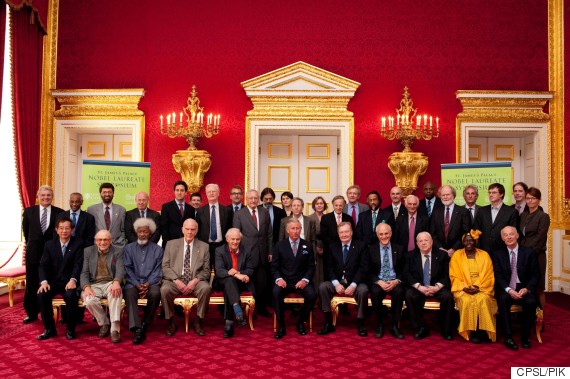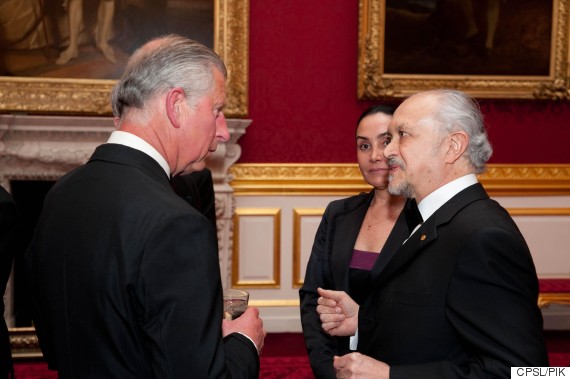
Prince Charles (centre) and John Schellnhuber (first row, far right) with participants of St. James' Palace Nobel Laureate Symposium in May 2009.
In the 1990s, governments changed their policies towards dealing with damage to the ozone layer -- a shift widely recognised as one of the most successful in environmental history. One of us (Mario Molina) led the research into the ozone layer that informed this shift.
The other (John Schellnhuber), building on the bulk of studies on climate change risks for different elements of the Earth System, helped distill them into a single number -- the 2 degree Celsius limit for global warming. This was aspirational thinking at the time, but a few years ago at the World Climate Summit, the governments of the world adopted it.
At a time when the world again faces unprecedented challenges to create a better future, what can we conclude from this? First, that science matters -- and that governments sometimes indeed will listen and respond when presented with hard evidence. But also, and very importantly, that clear and effective communication is essential. Science is crucial -- making it accessible is a responsibility.
Hence, producing groundbreaking scientific findings is one thing. It is probably our most noble task. But we also feel the responsibility to share our insights with governments and citizens, and to do it in a way for them to understand the consequences for humanity.
As individuals, we do this on a daily basis. We publish our results in scientific journals and reports, we advise our governments, and we communicate with the public directly through media and public discussions. But we also recognise that collectively, as scientists, we can do more.

Mario Molina and The Prince of Wales during the 2009 Nobel Laureate Symposium at St James' Palace.
The collective voices of science have shaped some of the pivotal decisions in our recent history, such as in 2009 when a group of Nobel laureates contributed to cementing sustainability on the agenda of a UN delegation tasked with creating a vision for global development for the coming decades.
Together with quite a number of the world's most respected scientists and economists, we formed the Earth League, to unite our voices in the global dialogue about the greatest challenges facing our societies. The breadth of expertise in this international alliance exemplifies the complexity of the consequences of some of the major forces shaping our future, not least climate change. The Earth League provides decision-makers with the state-of-the-art scientific information on the issue.
In this year of unprecedented opportunities for international collaboration on sustainable development and action on climate change, the importance of well-informed policy-making cannot be overstated. As scientists, we are essential to this process. Marked by Earth Day 2015, we -- along with fellow members of the Earth League -- chose to publish the "Earth Statement" to address existential questions for our planet. The science of climate change is real. The danger posed by climate change is real. We want to make blatantly clear that the legacy of our generation has to be one of courageous and intelligent action to avoid dangerous climate change. Otherwise, we'll fail our children and grandchildren.
Sometimes just a few numbers tell a big story. Global warming must be limited to below two degrees Celsius; that's what the world's governments agreed upon. Almost one degree of global warming has already taken place (IPCC WGI, 2013). Hence greenhouse gas emissions must be halved by 2050 and reduced to net zero by 2080-2100 in order to avoid a dangerous increase in the risks which arise from climate change, like crossing points of no return such as Greenland and Antarctica ice sheet melting. More than three quarters of known fossil-fuel resources must be left in the ground; instead of being burned and emissions being pumped into the atmosphere. 194 governments are responsible for setting us on this path when they meet in Paris at the end of this year. So, the challenge is huge. Yet the costs of not stepping up to the challenge, economically and in terms of human suffering, are much, much greater.
Our societies aim to become experts in managing risks of all kinds, whether they be financial risks, or risks to national security. Yet too many decision-makers strangely tend to look the other way when it comes to climate change. The level of risk we face if we don't act decisively and immediately to decarbonize our global economy is far greater than what would be considered tolerable in the face of more traditional threats. In fact, our current levels of greenhouse gas emissions already imply a 10 percent probability of global warming exceeding a disastrous level of six degrees by the end of this century. This one in ten risk is the equivalent of accepting around 10,000 airplane crashes per day. The world's governments must wake up to their responsibilities as risk managers for our global climate.
Even the most likely climate-change trajectory, which is on a path to global warming of around four degrees Celsius, would leave our world irrevocably changed. This is a world we don't know and we don't want to know. Failure to act to stop climate change confronts our societies with unimaginable threats, particularly to the most poor and vulnerable people on our planet. Sea-level rise threatens the very existence of low-lying islands; persistent droughts and unprecedented floods endanger food security and human lives. No price tag could ever measure the resulting human suffering and loss of countries, cultures and creatures.
The latest scientific research tells us that we also face a real risk of crossing tipping points that will trigger drastic, irreversible climate changes. These aren't creeping changes, but massive disruptions that push our Earth system into unknown regimes. Just last year, two independent studies confirmed that melting of the West-Antarctic ice sheet has crossed a threshold. This event alone could potentially lead to one meter sea-level rise globally. We know that further tipping points lie along our current global warming path. We don't know exactly when we will cross the next one. The only responsible act of risk management is to immediately start to minimize future climate change.
In 2015 the international community has the opportunity -- and the moral obligation -- to make decisive progress to ensuring a safe climate future and a path of sustainable development. We have formulated eight key elements of climate action, described in the "Earth Statement", that must not go unheeded by the delegates to the Paris Climate Change Conference. They must find an agreement that leaves a safe, equitable and prosperous legacy for future generations.
Climate change will leave no aspect of our society and natural world untouched. As scientists, we feel the weight of responsibility on our shoulders to communicate our knowledge of the risks we face. This is a burden we cannot bear on our own. The decision-makers of our time must heed the call coming not just from science, but from a global citizens' movement, to become true stewards of our planet.